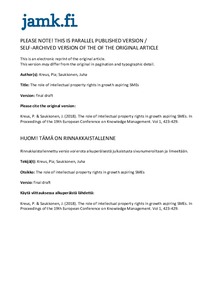The role of intellectual property rights in growth aspiring SMEs
Kreus, Pia; Saukkonen, Juha (2018)
Kreus, Pia
Saukkonen, Juha
Academic Conferences and Publishing International
2018
All rights reserved. This publication is copyrighted. You may download, display and print it for Your own personal use. Commercial use is prohibited.
Julkaisun pysyvä osoite on
https://urn.fi/URN:NBN:fi:amk-201904094669
https://urn.fi/URN:NBN:fi:amk-201904094669
Tiivistelmä
Small and medium sized enterprises (SMEs) are significant innovators in the economy. The competitive advantage of the firms depends highly on successful knowledge management. According to earlier studies on growth seeking innovative firms, company performance and measurement should be connected to the management of intellectual capital. However, the open innovation paradigm, lack of resources and rapidly evolving technologies are challenging to both managerial decision making and the conventional protection of intellectual property rights (IPRs). Hence, good management of IPRs, knowledge sharing and future technology anticipation are the decisive driving factors for the international growth and wealth of the firms. In addition, a better integration of innovation processes to business models is required. Previous academic research indicates that this could be achieved by connecting those processes to the performance and measures of the firm by other management functions, such as human resource management.
The aim of this paper was to explore the current trends of human resource management (HRM) in identifying and managing the increasingly complex issue of IPRs. This research attempted to find answers to the question of what perceptions the managers of SMEs have of IPRs and, furthermore, of how they recognise those individuals, teams, projects or processes that they need to engage in order to implement and communicate the pursued strategies.
Six representative executives or HRM managers from technology driven SMEs in Finland were interviewed by using semi-structured interviews. The primary data was analysed by using content analysis. The findings indicate that the IPR knowledge base in firms is often key person centric and that the recognition of IPR is not made explicit in the company. The management of IPR is not aligned with the business practises, and the shortage of resources can lead to the outsourcing of strategically important activities, such as IPR processes or sales. It can be claimed that IPR management should be seen as a core and mission-critical process for growth aspiring SMEs, and well planned human resource processes would be here the natural contributors.
The aim of this paper was to explore the current trends of human resource management (HRM) in identifying and managing the increasingly complex issue of IPRs. This research attempted to find answers to the question of what perceptions the managers of SMEs have of IPRs and, furthermore, of how they recognise those individuals, teams, projects or processes that they need to engage in order to implement and communicate the pursued strategies.
Six representative executives or HRM managers from technology driven SMEs in Finland were interviewed by using semi-structured interviews. The primary data was analysed by using content analysis. The findings indicate that the IPR knowledge base in firms is often key person centric and that the recognition of IPR is not made explicit in the company. The management of IPR is not aligned with the business practises, and the shortage of resources can lead to the outsourcing of strategically important activities, such as IPR processes or sales. It can be claimed that IPR management should be seen as a core and mission-critical process for growth aspiring SMEs, and well planned human resource processes would be here the natural contributors.
